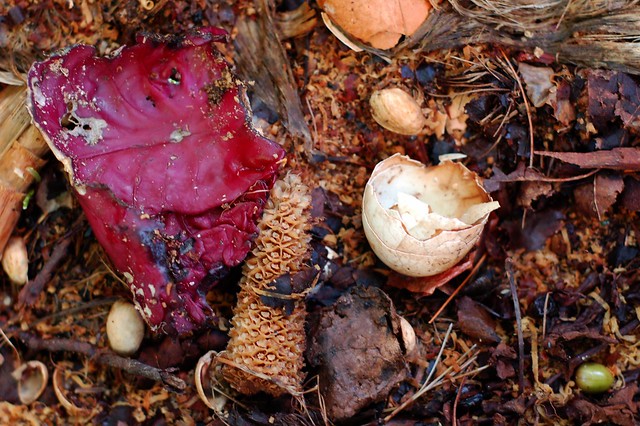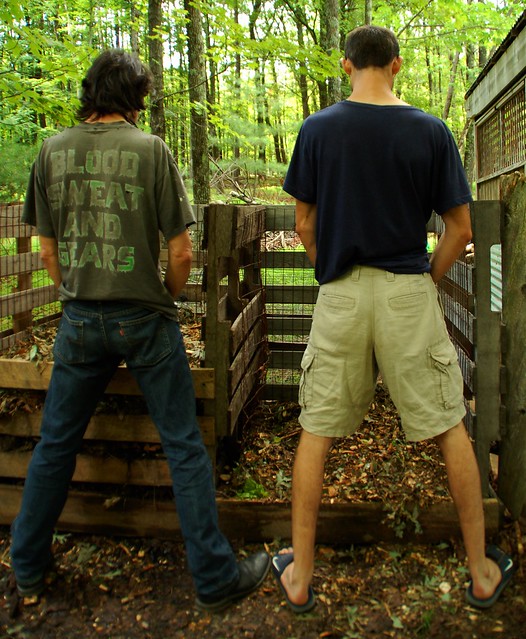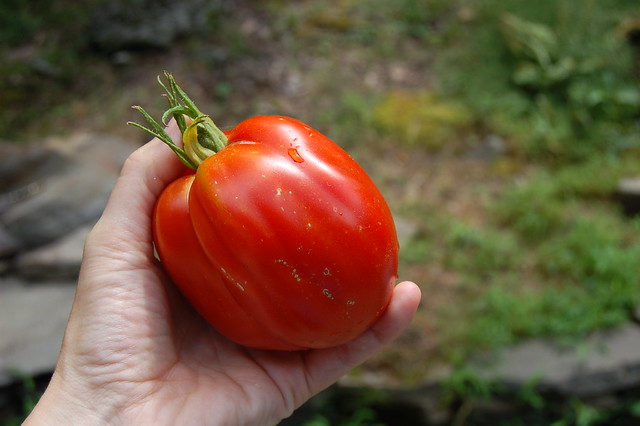Why, you ask? Because human urine is rich in the nitrogen that plants need to thrive. The chemical fertilizers widely used to add nitrogen to the soil come at a steep cost to our environment and our health. Their application results in algal blooms, oceanic dead zones, contaminated drinking water, human health problems and more. Meanwhile, we're literally flushing billions of tons of free, naturally-created nitrogen down the toilet each year.
I first learned about this idea from permaculture and edible forest expert, Dave Jacke, when he came to Woodstock early this spring to walk the land at the new Thorn Preserve, a beautiful, 60-acre parcel that was recently gifted to the Catskill Center and is being jointly managed by the Woodstock Land Conservancy of which I am a board member.
According to Dave, peeing on your compost is a wonderful, completely free, non-toxic way to replenish essential minerals like nitrogen in your soil. And if you want to go one step further, make some biochar (the pure carbon that is leftover from burning wood without oxygen - it makes an incredible absorber and adsorber of minerals and nutrients) and then pee on that as the you'll be creating an all natural, long-lasting plant feeding system. Or, if you're not quite ready to take the biochar-making plunge, just put the ashes from your woodstove or campfire in your compost and pee on the whole mess, as research seems to indicate that wood ash and pee is a great combo for the plants, too.
I did a bit of digging and found several studies that support Dave's claim. A field study done in Kathmandu, Nepal found that sweet peppers fertilized with human urine and compost yielded the most fruits and tallest plants of the eight treatments they tried.
Another study led by an at the University of Finland found that greenhouse tomatoes fertilized with a mixture of human urine and ash yielded nearly four times more tomatoes than non-fertilized plants. The tomatoes fertilized with urine alone actually yielded a bit more but the plants did not grow as tall or strong and the tomatoes contained less magnesium than those fertilized with both ash and urine. According to the researchers, one person could provide enough pee to fertilize roughly 6,300 tomato plants a year, yielding 2.4 tons of tomatoes. That's a lot of tomatoes...
Although this idea may be new to many of us, it's actually a pretty old one. Nepalese farmers have been applying urine to their crops for centuries. And "night soil" (a.k.a. human manure) served as a traditional fertilizer in Japan and China right up until World War II in Japan and the 1960s in China. But I would not recommend using "humanure" -- in addition to the very considerable ick factor, there are far too many pathogen and heavy metal-related pitfalls to make it safe or practical for home usage (plus, who really wants to go there?)
Some have raised concerns about hormonal or pharmaceutical residues in human urine but, ideally, your compost should get hot enough to burn off any potentially harmful residue in your urine. It's this same magic of composting that allows commercially-run composting facilities to transform all sorts of waste, including meat scraps, bones, cardboard, waxed paper, grass clippings from lawns that may contain both insecticides and weed killers into rich dirt that even an organically-certified farm can use. And use it, they do.
So get out there and pee on that compost pile! If you don't have a penis, you can pee in a bucket and then get someone who does have a penis to make use of his superior upper body strength and haul it out to the compost for ya.
At our house, we've begun adding the ashes from our wood stove to our compost pile and we pee on it every chance we get (which is a lot.) This is good news for our two boys though it will take the younger one a few years to be able to manage it as he's still in diapers. But it gives him something to look forward to.
You might also like:
- Grow Your Own Garlic
- Can We Outcompete Invasive Plants?
- Extending the Growing Season with Cold Frames & Hoop Houses






4 comments:
Actually, biochar does not contain ash! It is pure carbon, but is an amazing absorber and ADsorber of nutrients and such, so it holds them in the soil and prevents them from washing away. Ash is the residue left after burning IN the presence of oxygen. Biochar is the residue of burning organic matter WITHOUT oxygen.
HA! I'm so glad you brought up the frequency of the peeing because I was all "dude. i pee a lot".. hahaha... Love this! And look at all the water you save from not flushing!
...not sure i could get away with this in the city. on my condo balcony. facing the courtyard ;) I'll live through you.
Thanks for the clarification, Dave. I've updated to hopefully fix that error and make a distinction between biochar and regular old ash (though that study in Finland does seem to lend some credence to the ash and pee combo being beneficial even if it might not be quite as beneficial as biochar and pee - the "gold standard", if you will.
Kristy, yeah, that might be a little tough... Do you compost out on that balcony? If you did want to try it, you could always pee in a yogurt container and discreetly "water" your compost from time to time :) Or just live vicariously through me, that's good, too!
Eve, now all I want to know is: do you use a bucket?! Great post, thanks!
Post a Comment